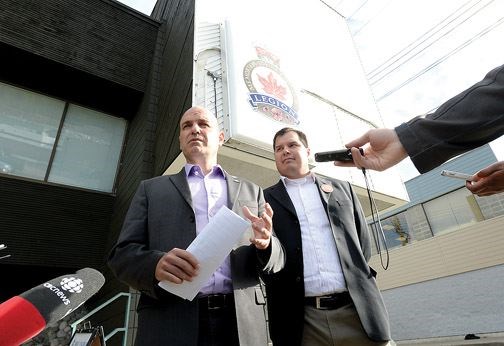Expanding on party leader Tom Mulcair's Monday announcement of $454 million for Canadian veterans under an NDP government, two northern B.C. candidates spelled out what it would mean for Prince George on Tuesday.
Skeena-Bulkley Valley incumbent Nathan Cullen teamed up with Cariboo-Prince George candidate Trent Derrick to flesh out the NDP plan, which includes $26 million for re-opening shuttered regional Veterans Affairs offices.
The closure of the offices, including one in Prince George in 2012, has been a point of contention for the local branch of the Royal Canadian Legion.
"At the same time as Stephen Harper puts Canadian lives in harm's way and trumpets military action he has undermined and eroded the services that they count on back here at home," said Derrick.
Similar promises to re-open the nine offices, closed as a cost-cutting measure by the Harper Conservatives, have been made by the Green and Liberal parties, while local Independent candidate Sheldon Clare has said he would like to see - at minimum - dedicated staff at Service Canada offices.
The Prince George Veterans Affairs office was said to have 15 active files when it was closed. But the NDP have met with Legion members and other veterans who said that personal contact is important, said Cullen, and that a 1-800 number or website isn't a suitable replacement.
But the NDP plan is bigger than just the offices, Cullen added, pointing to a broader veterans platform that includes counselling for post-traumatic stress disorder, helping those who need home modifications, increasing spousal benefits and removing the Veterans Appeal Board.
"It's easy to say you'll open an office, and we're happily committing to that; it's what kind of service does that office provide. What happens when that veteran contacts their government saying 'You promised me that if I served my country, my country would serve me back,'" said Cullen. "And veterans are very proud people - they don't come forward easily with these kinds of things. And the fact they've had to fight so hard for basic services is frankly, I think, a shame upon our country. We can do a lot better and we will."
On Tuesday, the Conservative party announced that if re-elected to form government, they would issue a Canadian Veterans Card to every member of the military who is honourably discharged. The card would serve as official government identification and would have to be updated every 10 years.
"The CVC will be issued the moment a veteran is released from the military, enabling Veterans Affairs Canada to immediately contact the veteran and make him or her aware of the benefits and services available," said Veterans Affairs Minister Erin O'Toole, in a press release. The current Record of Service card some veterans receive is only available to regular and reserve force members with at least 10 years of military service.



